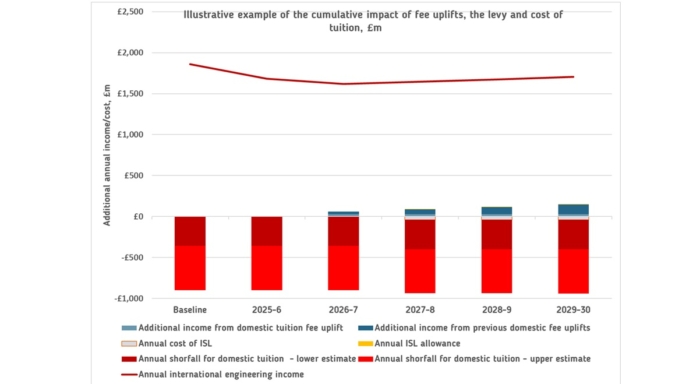The Institute of Apprenticeships and Technical Education consulted on how the employer stamp of approval should be granted to qualifications funded through the Lifelong Learning Entitlement (LLE), seeking input on how to ensure LLE and modular design ensures high quality, relevant and flexible qualifications.
The EPC collaborated with the Engineering Council on the following response:
No, the term ‘Professional Technical Qualifications’ is misleading when qualifications have not been assessed by PSRBs as aligning with professional standards. The occupational standards do not necessarily align with requirements of relevant professions. We would urge IfATE to work with professional, statutory and regulatory bodies, to ensure that qualification align with the standards set by those bodies on behalf of professions.
The EPC membership has reported repeatedly that degree apprenticeship Standards can be too narrow. This arises because the development of a Standard has been led by a small number of employers who base it on their experience of needs. Once a Standard has been established, competing Standards cannot be recognised. However, if the standard does not reflect the wider needs of employers and the apprentices’ need for skills, knowledge and behaviours, then the standard blocks the space for a more widely appropriate standard.
Occupational standards currently fail to focus adequately on apprentices (students) wider learning and long-term goals. To be truly standalone, modular qualifications must incorporate on and off boarding, study skills, etc. Broader skills support, such as critical thinking and argument construction, are currently delivered on a timeframe intended for learners accessing a full programme. This would need to be adapted to ensure all learners have access, and expanded to recognise that many returning modular learners may not have accessed levels 4 to 6 in several years, if at all.
IfATE should consider alignment with actual, established, professional Engineering standards as defined by the Engineering Council. These are nationally and internationally recognised and are in accordance with international accords, making accredited qualifications internationally transferable. Modular credit needs to hold currency not just with employers, but against professional standards.
We are concerned that this proposal ignores that occupational standards are developed without consultation of PSRBs and therefore do not necessarily reflect the needs of professional sectors that qualifications may claim to support. We would urge IfATE to work with professional, statutory and regulatory bodies, to ensure that qualification align with the standards set by those bodies on behalf of professions. The term ‘Professional Technical Qualifications’ is misleading when qualifications have not been assessed by PSRBs as aligning with professional standards.
Technical education needs stability, and repeated rebranding of vocationally related qualifications causes confusion and devalues qualifications. There are many valued and well-established qualifications which support engineering careers at this level, some of which are very specialist to reflect the nature of the roles they support, it is important that these qualifications remain available.
No, as the occupational standards do not necessarily align with requirements of relevant professions. We would urge IfATE to work with professional, statutory and regulatory bodies, to ensure that qualification align with the standards set by those bodies on behalf of professions.
IfATE should consider alignment with actual, established, professional Engineering standards as defined by the Engineering Council. These are nationally and internationally recognised and are in accordance with international accords, making accredited qualifications internationally transferable.
Technical education needs stability, and repeated rebranding of vocationally related qualifications causes confusion and devalues qualifications. There are many valued and well-established qualifications which support engineering careers at this level, some of which are very specialist to reflect the nature of the roles they support, it is important that these qualifications remain available.
We are concerned that this proposal ignores that occupational standards are developed without consultation of PSRBs and therefore do not necessarily reflect the needs of professional sectors that qualifications may claim to support. We would urge IfATE to work with professional, statutory and regulatory bodies, to ensure that qualification align with the standards set by those bodies on behalf of professions. The term ‘Professional Technical Qualifications’ is misleading when qualifications have not been assessed by PSRBs as aligning with professional standards.
at the level directly below the qualification level?
No. The occupational standards do not necessarily align with requirements of relevant professions. We would urge IfATE to work with professional, statutory and regulatory bodies, to ensure that qualification align with the standards set by those bodies on behalf of professions.
and/or progression competence by selectively covering outcomes from one or more occupational standards at levels 4, 5 and 6?
No. The occupational standards do not necessarily align with requirements of relevant professions. We would urge IfATE to work with professional, statutory and regulatory bodies, to ensure that qualification align with the standards set by those bodies on behalf of professions.
IfATE should consider alignment with actual, established, professional Engineering standards as defined by the Engineering Council. These are nationally and internationally recognised and are in accordance with international accords, making accredited qualifications internationally transferable.
Technical education needs stability, and repeated rebranding of vocationally related qualifications causes confusion and devalues qualifications. There are many valued and well-established qualifications which support engineering careers at this level, some of which are very specialist to reflect the nature of the roles they support, it is important that these qualifications remain available.
We are concerned that this proposal ignores that occupational standards are developed without consultation of PSRBs and therefore do not necessarily reflect the needs of professional sectors that qualifications may claim to support. We would urge IfATE to work with professional, statutory and regulatory bodies, to ensure that qualification align with the standards set by those bodies on behalf of professions. The term ‘Professional Technical Qualifications’ is misleading when qualifications have not been assessed by PSRBs as aligning with professional standards.
No. The occupational standards do not necessarily align with requirements of relevant professions. We would urge IfATE to work with professional, statutory and regulatory bodies, to ensure that qualification align with the standards set by those bodies on behalf of professions.
EPC membership has reported repeatedly that degree apprenticeship Standards can be too narrow. This arises because the development of a Standard has been led by a small number of employers who base it on their experience of needs. Once a Standard has been established, competing Standards cannot be recognised. However, if the standard does not reflect the wider needs of employers and the apprentices’ need for skills, knowledge and behaviours, then the standard blocks the space for a more widely appropriate standard.
IfATE should consider alignment with actual, established, professional Engineering standards as defined by the Engineering Council. These are nationally and internationally recognised and are in accordance with international accords, making accredited qualifications internationally transferable.
Technical education needs stability, and repeated rebranding of vocationally related qualifications causes confusion and devalues qualifications. There are many valued and well-established qualifications which support engineering careers at this level, some of which are very specialist to reflect the nature of the roles they support, it is important that these qualifications remain available.
We are concerned that this proposal ignores that occupational standards are developed without consultation of PSRBs and therefore do not necessarily reflect the needs of professional sectors that qualifications may claim to support. We would urge IfATE to work with professional, statutory and regulatory bodies, to ensure that qualification align with the standards set by those bodies on behalf of professions. The term ‘Professional Technical Qualifications’ is misleading when qualifications have not been assessed by PSRBs as aligning with professional standards.
An advantage of expanding Level 4 and 5 qualifications based on the existing provision in HE providers is that innovation in provision is driven by competition for students and the desire to ensure positive employment outcomes. Alongside institutional autonomy, this allows providers to develop effective models that meet changing needs. This is unlikely to be possible within a framework more tightly modelled around Standards structures.
There are many established and valued specialist qualifications that support engineering and the built environment that must continue to be supported if the workforce is to continue to have essential skills.
Those accessing learning through the LLE should not experience additional barriers and crucial to this is ensuring learners have the prior education needed to access specific modules, and the support required to succeed. This wraparound support is potentially one of the biggest resource implications of the LLE.
IfATE should work with higher education providers and PRSBs (and not just those where regulation is statutory) to avoid duplication of effort and associated wastage of resource, giving due regard to standards set on behalf of professions and recognition of qualifications by PSRBs against their standards. R&D is often a collaboration between universities and the private sector. The sharing of best practice examples would better inform evidence-based decisions supported by the engineering industry.
Professional learning outcomes at levels 4-6 in engineering are well established and already embedded across levels 4-6 through AHEP 4. These learning outcomes are threshold standards and should be interpreted in the context of a particular disciplinary or multidisciplinary engineering practice, and the level of study.
that should be made available to users of an approved qualification?
Recognising that a full qualification is not always the best, desired or necessary route for a learner is crucial to the LLE’s success, and rigidly defining pathways falls short of this. Micro-credentials and short courses are excluded as not part of a bigger programme.
comprehension of their value, outcomes and place within the wider learning journey?
Recognising that a full qualification is not always the best, desired or necessary route for a learner is crucial to the LLE’s success, and rigidly defining pathways falls short of this. Micro-credentials and short courses are excluded as not part of a bigger programme.
Occupational standards currently fail to focus adequately on apprentices (students) wider learning and long-term goals. To be truly standalone, modular qualifications must incorporate on and off boarding, study skills, etc. Broader skills support, such as critical thinking and argument construction, are currently delivered on a timeframe intended for learners accessing a full programme. This would need to be adapted to ensure all learners have access, and expanded to recognise that many returning modular learners may not have accessed levels 4 to 6 in several years, if at all.
Recognising that a full qualification is not always the best, desired or necessary route for a learner is crucial to the LLE’s success, and rigidly defining pathways falls short of this. Micro-credentials and short courses are excluded as not part of a bigger programme.
promote the development of competence?
Occupational standards currently fail to focus adequately on apprentices (students) wider learning and long-term goals. To be truly standalone, modular qualifications must incorporate on and off boarding, study skills, etc. Broader skills support, such as critical thinking and argument construction, are currently delivered on a timeframe intended for learners accessing a full programme. This would need to be adapted to ensure all learners have access, and expanded to recognise that many returning modular learners may not have accessed levels 4 to 6 in several years, if at all.
Recognising that a full qualification is not always the best, desired or necessary route for a learner is crucial to the LLE’s success, and rigidly defining pathways falls short of this. Micro-credentials and short courses are excluded as not part of a bigger programme.
There is much existing research about module design principles, much of which is intrinsically linked to the inclusion agenda. An evidence-based approach should be adopted.
accessibility and EDI in qualification materials and assessment?
Inclusive curriculum design should be a golden thread, not an appendage. There is much existing research about module design principles, much of which is intrinsically linked to the inclusion agenda. An evidence-based approach should be adopted. IfATE should fully consider a Universal Design for Learning approach.
accessible levels 4 to 6 qualification system?
IfATE should fully consider a Universal Design for Learning approach. Equality of access to Careers Information, Advice and Guidance is also critical to accessibility.
which have not yet been identified?
Evidence suggests that reasonable adjustments to assessment processes do not level the playing field for neurodivergent learners.
Stability is needed in the education and skills system and therefore further change is unhelpful, and another generation (which has suffered significant disruption to early education and social development due to the pandemic) should not be treated as a ‘guinea pig’ in educational reform. Change is particularly unhelpful at a time when most if not all stakeholders in the system are struggling due to years of under resourcing.
awarding bodies and providers?
Many individuals achieve professional titles a number of years after completing formal education. The Engineering Council is unsure how it might be able to recognise modules where our accreditation and approval is currently at qualification or apprenticeship level against a full set of learning outcomes or competences that meet a threshold standard of knowledge and understanding or competence for an engineer or technician. A factor influencing any future decisions on modular approaches would be alignment with international standards and how such qualifications would be recognised beyond the UK.




